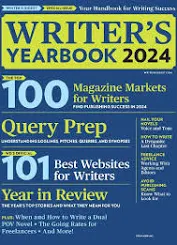The Four Elements of Query Pitches and Posts

“You’ll need all four elements in your tool bag over time,” Amy Collins tells book authors in the Writer’s Digest 2024 Yearbook, referring to statements authors send to agents and publishers about their books. When it comes to blog marketing, content writers can use all these elements to attract and maintain the attention of blog readers.
1. Loglines:
These answer the question, “Would I like this book?”, using culturally relevant references to give the reader a chance to identify their potential interest.
The reason so many online searchers return to a particular search engine to find products, services, and information, is that they’ve found what they “would like” on that site before. The organic search process is the “logline”, delivering readers to your blog post who are most “likely to like” the information you’ve provided.
2. Elevator pitches:
These answer the question “What’s the book about?”, giving the reader “an idea of the premise and the stakes”.
When it comes to blogs, the “elevator pitch” is the title. We want the searcher to click on the link, and of course we want search engines to offer our content as a match for readers seeking information and guidance on our topic. More than that, though, a blog post title in itself constitutes a set of implied promises to visitors. In essence, you’re saying, “If you click here, you’ll be led to a post that in fact discussing the topic mentioned in the title.
3. Query pitches:
These add a few more compelling details to convince the agent that your book is different from – and better than – others in its category. What does your book add to the game? What are your future readers buying and reading right now?
To achieve success in content marketing, your having gotten to know your particular audience is crucial. While you may point out that your product or service can do something your competitors can’t, that particular “advantage” may or may not be what your audience is likely to value
4. Plot synopses:
These answer the question, “Does this book have the elements needed to be successful?” Here is where the author tries to prove that “the plot is not derivative or dull”. Collins cautions authors to focus on the main character arc and the story arc without over-cramming details. Just as “cramming everything about your plot into your synopsis will not help convince an agent to read your book,” cramming everything about your product or service into a single blog post is not going to help convince readers to take the next step.
In a sense, focus is the point in blog content writing. At Say It For You, we firmly believe in a razor-sharp focus on just one story, one idea, one aspect of your business, with the message geared towards one narrowly defined target audience.
Very much like authors pitching their book ideas to agents and publishers, at Say It For You, we know that the secret of success lies in skillfully using Amy Collins’ four elements.

Leave a Reply
Want to join the discussion?Feel free to contribute!